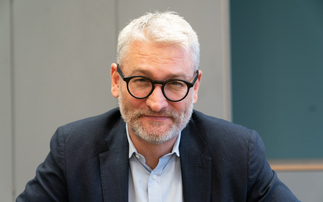Raquel Pichardo-Allison speaks to Schroders executive vice chairman Massimo Tosato about how the asset management business has produced healthy results
Schroders’ institutional asset management business has experienced a turnaround of sorts, and the changes can be seen through record inflows in the past year. The company has turned outflows into inflows and analysts and company officials are saying the firm has successfully reinvented its institutional business.
“I think the institutional business at Schroders has been reinvented in a number of ways. Ten years ago it was built almost exclusively around mature defined benefit markets like the UK and Japan. Today, the picture is very different,” said Schroders executive vice chairman Massimo Tosato.
It’s not just about performance. It’s about strategy, product positioning, client sector
The firm is putting a renewed focus on global defined contribution markets that will form part of second and third pillar pension schemes, particularly in the UK, where officials believe the market is at a pivotal point.
But Schroders, along with all asset managers, are looking to grow their businesses at a time when national pension provisions are being slashed to compensate for record national deficits. Encouraging workers to save for retirement is not always on the front burner.
Record breaker
Schroders pulled in record inflows in the first quarter of 2009 of £9bn (US$13bn), with £6bn alone coming from the institutional business. The Q1 performance brought total assets under management to £154.2bn, up 68% from a year earlier.
The outflows in institutional lasted some four years. The firm suffered negative flows from the first quarter of 2005, when they started providing quarterly reports, through the second quarter of 2009.
“Seventeen quarters, with one exception in Q2 2008,” said Evolution Securities equities analyst Michael Sanderson. “They have now reported four quarters of positive flows in a row in institutional. It does feel like they’ve turned a corner.”
Tosato credits the inflows in part with improved performance.
“In terms of investment performance, we’ve done a good job in reviewing all the elements of the investment process of our products in a very clinical way, to build an investment process that is repeatable and predictable. As a fundamental asset manager, there is still human talent, and that’s at the heart of it at the end,” said Tosato.
Over the past three years, the watermark for institutional investors to generally feel comfortable with a product, 76% of Schroders’ strategies have outperformed their benchmarks.
But performance is just one piece of the puzzle, he said.
“It’s not just about performance. It’s about strategy, product positioning, client sector,” said Tosato. “We also re-defined our market positioning and product strategy and enhanced our distribution capability which is, today, one of the most sophisticated and competitive in the market place. This strategy included a focus on growth channels and innovative products such as multi-asset and QEP (Quantitative Equity Product) to rebuild gross sales.”
Sanderson said officials at Schroders were slow to respond to changes in the market in the first half of the decade. “Now the business is a well diversified multi-asset manager matching product, performance and distribution,” he said.
Focus on DC
Schroders has historically been known as a defined benefit stalwart, but is focusing much of its growth on the global defined contribution business in both retail and institutional markets.
Asked about the firm’s five-year plan, Tosato said one focus would be defined contribution in developed and emerging markets that have a strong emphasis on second and third pillar savings.
Asset management revenues in the first quarter totalled £244.8m, up 92% from the previous year. Tosato said approximately a quarter of the revenues came from business derived from second and third pillar scheme management. In the next five years, he expects about 50% of the revenues from net new business to derive from these types of schemes.
The firm is especially setting its sights on its own backyard. Schroders officials believe the UK defined contribution market is set to boom “after a number of years of stale growth”, Tosato said.
That they are focusing on their home-turf is no surprise.
According to data from consultancy Towers Watson, globally, DC assets now comprise 42% of all pension assets, up 10 percentage points from 1999. The UK is among the countries leading the growth in DC, along with the US and Australia.
In the UK, it is widely said that a complex regulatory landscape has nearly regulated the DB scheme out of business, with more and more companies closing their DB funds in exchange for the DC plan.
Tosato declined to provide details about specific growth targets in the UK DC market.
“What I can say is we’ve had a very relevant position in defined benefit and that’s a key component of our institutional business. As such, with the substitution effect of DC on DB in the market, we need to capture a similar position in DC as we have had in DB,” said Tosato.
Other target areas include Australia, Japan and the US, he said.
“After a number of years in the doldrums, we also want to rebuild our business in Japan, not just focusing on pensions, but also in financial institutions.”
Currently, 65% of the firm’s assets under management come from clients outside the UK.
Bifurcation in the market
Globally, Schroders will position itself in two ways to gain market share: offering specific strategies for larger investors, and taking a more holistic approach for smaller investors.
“For active managers like us, I believe the market will develop on one side as a component provider to large and sophisticated institutions that manage their own strategies and tactical asset allocation.
“On the other side, I believe that there will be demand for customised overall solutions to meet liabilities and investment objectives,” he said.
There is also a “bifurcation in the market” in the types of strategies investors are looking for. Investors have been moving away from beta-type strategies and looking for more “outcome oriented solutions”, said Tosato.
“While I think there will always be a place for traditional benchmark-relative products, demand for these types of solutions is currently being outstripped by demand for outcome-oriented,” he said.
Most recently, the firm has been pushing its Global Alternative Investor Access (GAIA) strategy, which gives investors access to third-party hedge fund managers and Schroders’ absolute return strategies through a UCITS III platform.
The GAIA platform was launched in November. The first manager to partner with Schroders was Egerton Capital for the Schroder GAIA Egerton European Equity fund, a long-short fund. In May, Schroders announced its plans to launch an emerging market long-short equity fund with Sloane Robinson.
However, obstacles to growth remain going forward, some of which are out of the firm’s control.
In a note to investors following Schroders’ first quarter earnings in early May, Numis Securities analyst David Mccann said: “As the most equity market exposed amongst larger asset managers, evidently volatile markets are likely to create short-term headwinds for the company and could begin to negatively affect investor sentiment, and therefore flows.”
Tosato sees a longer-term threat in the regulatory framework of countries around the world.
He said the ability of countries in Asia and Europe, particularly in light of the current financial turmoil in Europe, to encourage long-term savings remains a risk.
“We see the tax incentivisation a key element to growth in second and third pillar. At the same time, the economic recovery will affect saving ratios. So taxation and saving ratio are going to be the two main aspects (to growth),” said Tosato.
Evolution Securities’ Sanderson said, “The momentum in the business is currently very impressive and the challenge for Schroders now is to maintain that momentum in raising net new money.”







